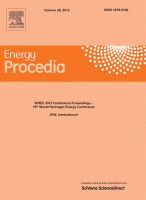
Joint Optimization for Coordinated Charging Control of Commercial Electric Vehicles Under Distributed Hydrogen Energy Supply
Publication Year: 2021
Author(s): Long T, Jia Q-S
Abstract:
The transition to the zero-carbon power system is underway accelerating recently. Hydrogen energy and electric vehicles (EVs) are promising solutions on the supply and demand sides. This brief presents a novel architecture that includes hydrogen production stations, fast-charging stations, and commercial EVs. The proposed architecture jointly optimizes the hydrogen energy dispatch and the EV charging location selection and is formulated by a time-varying bilevel bipartite graph (T-BBG) model. We develop a bilevel iteration optimization method combining the linear programming (LP) and the Kuhn-Munkres (KM) algorithm to solve the joint problem whose optimality is proved theoretically. The effectiveness of the proposed architecture on reducing the operating cost is verified via case studies in Shanghai. The proposed method outperforms other strategies and improves the performance by at least 13%, which shows the potential economic benefits of the joint architecture. The convergence and impact of parameters are assessed.
Source of Publication: IEEE Transactions on Control Systems Technology
Vol/Issue: 1-9p.
DOI No.: 10.1109/TCST.2021.3070482
Publisher/Organisation: Institute of Electrical and Electronics Engineers (IEEE)
Rights: Institute of Electrical and Electronics Engineers (IEEE)
URL:
https://ieeexplore.ieee.org/abstract/document/9405491/keywords#keywords
Theme: Vehicle Technology | Subtheme: Alternate fuels
Related Documents
Research Papers/Articles

Abstract:
More than 150 Hydrogen refueling stations were built around the world in the past 10 years. Fu... Read More
Research Papers/Articles

Abstract:
An increase in electricity production from Renewable Energy Sources (RES) requires a consequen... Read More
Research Papers/Articles
Understanding the Emissions Impacts of Large-Scale Vehicle Electrification in India
Published Year: 2021
Abstract:
In an effort to address critical air pollution problems and reduce carbon dioxide (CO2) emissi... Read More



